




 |
 |
 |
 |
||
 |
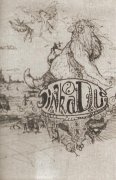 |
Sinkadus (1996, 60.33) ****/TTTTSnålblåstManuel Ågren Ättestupan |
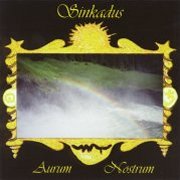 |
Aurum Nostrum (1997, 58.49) ****/TTT½SnålblåstManuel Ågren Ättestupan |
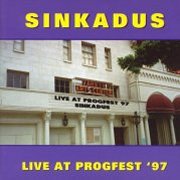 |
Live at Progfest '97/Aurum Nostrum, Version 1 (1998, studio tracks |
||
| (Spoken Introduction) Manuel Ågren Jag, Änglamarks Bane Snålblåst Ättestupan |
Snålblåst Manuel Ågren Ättestupan |
||
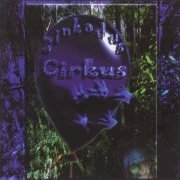 |
Cirkus (1999, 47.30) ****½/TTTTJag, Änglamarks BanePositivhalaren Kakafonia Valkyria Ulv i Fårakläder |
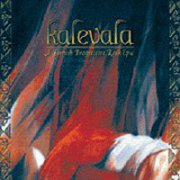 |
Kalevala: A Finnish Progressive Rock Epic (2003, 5.43) ****/TT½[Sinkadus contribute]Trubadurens Kval |
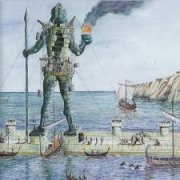 |
The Colossus of Rhodes: The 7th Progressive Rock Wonder (2005, 23.13) ****/TTT½[Sinkadus contribute]God of Silence |
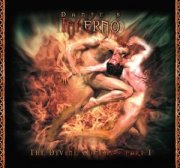 |
Dante's Inferno: the Divine Comedy, Part I (2008, 6.44) ***½/TT½[Sinkadus contribute]Stuck in Hell |
Current availability:
Mellotrons used:
Although Sinkadus formed in 1991 and released their cassette-only eponymous debut five years later, the first the world at large heard of them was one of its tracks, Manuel, included on the Third Cyclops Sampler. Unfortunately, one comparison immediately became unavoidable: Änglagård. While I don't dispute the year of their formation, I have difficulty with the concept that they came up with an almost identical sound to Änglagård's without hearing them, reinforced by the fact that it took them four years longer to release their debut album. They make all the same compositional and instrumental moves, with nowt but analogue gear, playing lengthy 'linear' pieces with little repetition, although (Swedish language) vocals are slightly more prominent; given the constraints they seem to have set themselves, they do a pretty decent job, only with less invention and lesser musicianship than their erstwhile mentors.
All four pieces on Sinkadus (released in re-recorded form as Aurum Nostrum the following year) have great moments, particularly Manuel (possibly their best song?), but these are tied together with a little too much, er, 'arrangement', rather than melody, especially on Ättestupan, which does, to be honest, drag a little. They certainly make all the right moves, but the end result is slightly unsatisfying, making you wish they'd spread their ideas a little less thinly, making a shorter, but tighter album. For all that, it's a damn' good record; it just isn't very original, even within the rarefied prog world where, as in so many genres, a change that would appear infinitesimal from the outside assumes major significance and often precipitates the conception (pun intended) of a whole new sub-genre. However, it knocks seven shades of unholy shite out of the likes of Pendragon, so that's quite enough sniping, thank you.
The trouble with the original version is that, without knowing an album fairly intimately, it's usually difficult to spot the differences in a slightly different version, so apart from the extra added Mellotron in Manuel, I'm really not sure what differentiates it from the official version. Mind you, every track on this version is slightly longer, though they may just be slower, of course. Unsurprisingly, the tracks sound less 'polished', but what they lose in sound quality, I'd say they gain in passion and all-round rawness. I prefer this version to the finished article, personally, but it's horses for courses on this one. There seems to be a little more Mellotron, too, though I refer you to my remark above re. how well you know an album.
There is, of course, more of Fredrik Karlsson's (borrowed, though I don't know from whom) Mellotron than you can shake a stick at; pretty much all strings and choir, but used effectively and tastefully, along with the other analogue keys on offer (no Manticore-style digital unpleasantness here), mostly organ with a bit of string synth here and there. Incidentally, the band featured both a flautist and a cellist, both female, though sadly, both have now left, taking some of the band's vocal and instrumental diversity with them. I actually find it quite difficult to pinpoint any major Mellotron moments; suffice to say, there's a lot of it about. Mellotroniacs will not be disappointed, although they used it a little less on the second version, sadly.
Sinkadus played LA's Progfest the same year, with Malcolm Parker at Cyclops (their European label) releasing the recording of the event as Live at Progfest '97 the following year, packaged with the original version of the album as a bonus disc, rather clumsily entitled Aurum Nostrum, Version 1. The trouble with putting out a live recording this early in a band's career (see: Spock's Beard) is their lack of material, usually resulting in a run-through of their sole album with a new track or two thrown in. Well, that's exactly what you get here, although at least they changed the album's track order around. The album has a great sound, very 'in your face', with the standard Progfest vintage keyboards to the fore. It's certainly a very 'live' document, with occasional dodgy musicianship, but it makes up for that with a real energy lacking in their studio work. Unsurprisingly, Sinkadus play the Aurum Nostrum versions of the tracks, so slightly less Mellotron than on the original demos, but still enough to earn the much-coveted 'Mellotron-drenched' award.
'99's Cirkus is an improvement on their debut compositionally, although there's no one highlight like Manuel. Track lengths are noticeably shorter all round, which is probably a good thing, with the compositions avoiding the extraneous faff that marred some of the Aurum Nostrum material. The songs are definitely melodically stronger, with better structure and less obviously Änglagård-influenced, although they're still pretty close, to be honest. The Mellotron work is more upfront this time, with flutes used here and there, sometimes under Linda Ågren's real one and is that Mellotron brass on Kakafonia? Anyway, more Mellotron, more to the front of the mix, so no complaints whatsoever.
It's hard to know which of the three versions of Aurum Nostrum to recommend, to be honest. Version 1 is the rawest, the official version's more polished and the live version is, er, livelier; you pays yer money and yer takes yer choice. Or something. I don't believe the live album ever appeared minus Version 1, but the latter is definitely unavailable without the former, unless you can track down a copy of the original cassette. This is a bit crap of me, really, 'cos a large part of the reviewing process is recommendation and I honestly can't say which you should go for. At the end of the day, the offical version's probably easier to find, so maybe you should just go with that. Cirkus is probably the better album, but I'd say the committed progger should buy both, for both music and Mellotron.
By the way, one small gripe. Chaps: Please lose that dodgy 'elf' graphic that's splattered all over your CD booklets and (now defunct) website - it just fuels the 'bloody hobbits' variety of anti-progressive sentiment. Take a(nother) leaf from Änglagård's book and use understated and tasteful artwork. You know it makes sense. Stop press: Sad to say, in early 2003 I heard that the band had quietly knocked it on the head, though whether it was due to their inability to find suitable replacements for their departed members or not is unknown. Stop stop press: So how exactly does that fit in with their contributions to Musea's Kalevala and Colossus of Rhodes multi-artist projects? The former is from '03 and they could conceivably have recorded their track before they split, but the latter dates from '05. Are they still together, but only as a studio project? Both tracks only seem to have the standard vocal/guitar/bass/keys/drums lineup, so it's possible the four remaining members could have done them... Anyway, two excellent efforts, pretty much the best thing on each album, with plenty of Mellotron to boot. Try to hear them.
See: Colossus Project